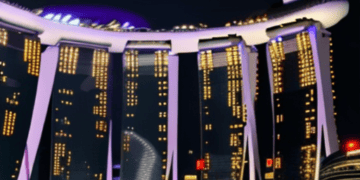Singapore, known for its well-managed, low-crime financial hub status, is facing a significant challenge to its clean business reputation due to a large-scale money laundering scandal. This case has resulted in the arrest of 10 foreign nationals and the seizure of assets worth 1.8 billion Singaporean dollars ($1.3 billion).
The individuals, originally from Fujian, China, and holding various foreign passports, are accused of laundering money obtained from overseas crimes, such as scams and online gambling, through Singapore’s financial institutions. The authorities have confiscated luxury items, including Hermes handbags, Patek Philippe watches, expensive whisky, and high-end vehicles like Bentley and Rolls-Royce.
This development raises questions about Singapore’s effectiveness in preventing illicit financial activities, despite its reputation as a ‘Switzerland of the East.’ The situation is also a concern for Singapore’s ruling party, currently dealing with political scandals, including a corruption probe involving a government minister.
Singapore’s allure for potential money launderers stems from its major financial hub status and the variety of financial instruments it offers. According to Woo Jun Jie, a senior research fellow at the National University of Singapore’s Institute of Policy Studies, the high volume of financial transactions in Singapore makes it challenging to identify illicit activities.
Mak Yuen Teen, a corporate governance expert at the NUS Business School, pointed out that money laundering often involves entities in tax haven jurisdictions where ownership details are not transparent. Eugene Tan, an associate law professor at Singapore Management University, noted that once funds enter Singapore’s financial system, they are less likely to be scrutinized, thus attracting money launderers.
The latest case also highlights the broader responsibilities of various stakeholders in the money laundering chain, such as property developers, luxury car dealers, and intermediaries like real estate agents, accountants, and lawyers. The Council for Estate Agencies (CEA) is investigating property agents possibly involved in transactions related to this case.
Experts like Mak have raised concerns about the effectiveness of existing anti-money laundering measures, especially in sectors beyond banking, which often bear the brunt of compliance responsibilities. The recent incident puts the focus on Singapore’s approach to GDP growth and market development versus regulation and enforcement.
Singapore’s efforts to attract the wealthy, including through the Global Investors Programme offering a fast-track to permanent residency, may also have contributed to the situation. The recent case prompts questions about whether Singapore’s regulatory framework has been effective in preventing money laundering and whether this incident is indicative of systemic issues.
The Monetary Authority of Singapore (MAS) is developing a digital platform, COSMIC, to improve information sharing on potential financial crimes. New rules also mandate due diligence checks by property developers on buyers and reports on suspicious practices.
Singapore’s robust regulatory framework is evident in its high rankings in various anti-money laundering indexes. However, this scandal serves as a test of the city-state’s ability to address high-level, sophisticated operations and maintain its reputation as a trusted financial hub.
Stay informed with supply chain news on The Supply Chain Report. Free tools for international trade are at ADAMftd.com.
#SingaporeMoneyLaundering #FinancialHubReputation #IllicitActivities #LuxuryAssetsSeized #SingaporeScandal #MASRegulations #COSMICPlatform #AntiMoneyLaundering #LuxuryGoodsCrime #FinancialCrimePrevention #RegulatoryFramework #GlobalInvestorsProgram #RealEstateCompliance #SingaporePolitics #SwitzerlandOfTheEast















